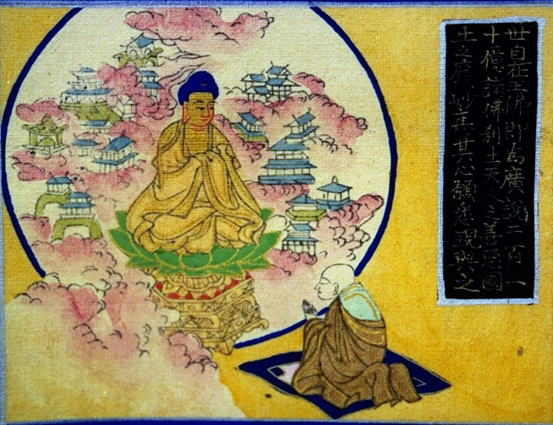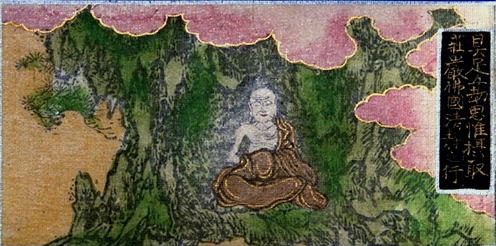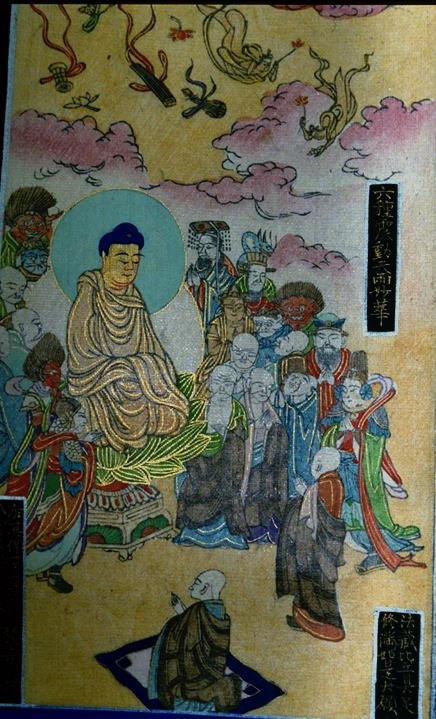Illustrated
Larger Sutra
(6-7)
Illustrations from the Larger Sutra Mandala
| Dharmakara's resolution to become a Buddha |
[6] The Buddha said to Ananda, "Having
spoken these verses, the Bhiksu Dharmakara
said to the Buddha Lokeshvararaja, 'Respectfully,
World-Honored One, I announce that I have
awakened aspiration for the highest, perfect
Enlightenment. I beseech you to explain the
Dharma to me fully, so that I can perform
practices for the establishment of a pure
Buddha-land adorned with infinite excellent
qualities. So please teach me how to attain
Enlightenment quickly and to remove the roots
of afflictions of birth-and-death for all.'"
The Buddha said to Ananda, "At that
time the Buddha Lokeshvararaja replied to
the Bhiksu Dharmakara, 'You yourself should
know by what practice you can establish a
glorious Buddha-land.' The Bhiksu said to
the Buddha, 'That is far too vast and deep
for my comprehension. I sincerely beseech
you, World-Honored One, to explain in detail
the practices by which Buddhas, Tathagatas,
established their pure lands. After I hear
that, I wish to practice as instructed
and so fulfill my aspirations.'
"At that time the Buddha Lokeshvararaja
recognized the Bhiksu Dharmakara's noble
and high aspirations, and taught him as follows:
'If, for example, one keeps on bailing water
out of a great ocean with a pint-measure,
one will be able to reach the bottom after
many kalpas [267c] and then obtain rare treasures.
Likewise, if one sincerely, diligently and
unceasingly seeks the Way, one will be able
to reach one's destination. What vow is there
which cannot be fulfilled?'
"Then the Buddha Lokeshvararaja explained
in detail the greater and lesser aspects
of two hundred and ten kotis of Buddha-lands,
together with the good and evil natures of
heavenly and human beings living there. He
revealed them all to the Bhiksu just as he
had requested. Then the Bhiksu, having heard
the Buddha's exposition of the glorious pure
land and also having seen all of them, resolved
upon his supreme, unsurpassed vows. His mind
being serene and his aspirations free of
attachment, he was unexcelled throughout
the world. For five full kalpas he contemplated
the vows, and then chose the pure practices
for the establishment of his Buddha-land."
Ananda asked the Buddha, "How long was
the life-span of beings in the land of the
Buddha Lokeshvararaja?"
The Buddha replied, "The length of life
of that Buddha was forty-two kalpas."
He continued, "After that Dharmakara
Bodhisattva adopted the pure practices which
had led to the establishment of the excellent
lands of two hundred and ten kotis of Buddhas.
When he had finished this task, he went to
the Buddha, knelt down at his feet, walked
round him three times, joined his palms in
worship and sat down. He then said to the
Buddha, 'I have adopted the pure practices
for the establishment of a glorious Buddha-land.'
The Buddha said to him, 'You should proclaim
this. Know that now is the right time. Encourage
and delight the entire assembly. Hearing
this, other bodhisattvas will practice this
Dharma and so fulfill their innumerable
great vows.' The Bhiksu replied, 'I beg you
to grant me your attention. Now I will fully
proclaim my vows.'

Lokeshvararaja shows many Buddha-lands to
Dharmakara.

Dharmakara's contemplation for five kalpas

Dharmakara's proclamation of
the Forty-eight Vows |
[7] (1) If, when I attain Buddhahood, there
should be in my land a hell, a realm of hungry
spirits or a realm of animals, may I not
attain perfect Enlightenment.
(2) If, when I attain Buddhahood, humans
and devas in my land should after death fall
again into the three evil realms, may I not
attain perfect Enlightenment.
(3) If, when I attain Buddhahood, humans
and devas in my land should not all be the
color of pure gold, may I not attain
perfect Enlightenment.
(4) If, when I attain Buddhahood, humans
and devas in my land should not all be of
one appearance, and should there be any difference
in beauty, may I not attain perfect Enlightenment.
(5) If, when I attain Buddhahood, humans
and devas in my land should not remember
all their previous lives, not knowing even
the events which occurred during the previous
hundred thousand kotis of nayutas of kalpas,
may I not attain perfect Enlightenment.
(6) If, when I attain Buddhahood, humans
and devas in my land should not possess the
divine eye of seeing even a hundred thousand
kotis of nayutas of Buddha-lands, may I not
attain perfect Enlightenment.
(7) If, when I attain Buddhahood, humans
and devas in my land should not possess the
divine ear of hearing [268a] the teachings
of at least a hundred thousand kotis of nayutas
of Buddhas and should not remember all of
them, may I not attain perfect Enlightenment.
(8) If, when I attain Buddhahood, humans
and devas in my land should not possess the
faculty of knowing the thoughts of others,
at least those of all sentient beings living
in a hundred thousand kotis of nayutas of
Buddha-lands, may I not attain perfect Enlightenment.
(9) If, when I attain Buddhahood, humans
and devas in my land should not possess the
supernatural power of travelling anywhere
in one instant, even beyond a hundred thousand
kotis of nayutas of Buddha-lands, may I not
attain perfect Enlightenment.
(10) If, when I attain Buddhahood, humans
and devas in my land should give rise to
thoughts of self-attachment, may I not attain
perfect Enlightenment.
(11) If, when I attain Buddhahood, humans
and devas in my land should not dwell in
the Definitely Assured State and unfailingly
reach Nirvana, may I not attain perfect Enlightenment.
(12) If, when I attain Buddhahood, my light
should be limited, unable to illuminate at
least a hundred thousand kotis of nayutas
of Buddha-lands, may I not attain perfect
Enlightenment.
(13) If, when I attain Buddhahood, my life-span
should be limited, even to the extent of
a hundred thousand kotis of nayutas of kalpas,
may I not attain perfect Enlightenment.
(14) If, when I attain Buddhahood, the number
of the shravakas in my land could be known,
even if all the beings and pratyekabuddhas
living in this universe of a thousand million
worlds should count them during a hundred
thousand kalpas, may I not attain perfect
Enlightenment.
(15) If, when I attain Buddhahood, humans
and devas in my land should have limited
life-spans, except when they wish to shorten
them in accordance with their original vows,
may I not attain perfect Enlightenment.
(16) If, when I attain Buddhahood, humans
and devas in my land should even hear of
any wrongdoing, may I not attain perfect
Enlightenment.
(17) If, when I attain Buddhahood, innumerable
Buddhas in the land of the ten quarters should
not all praise and glorify my Name, may I
not attain perfect Enlightenment.
(18) If, when I attain Buddhahood, sentient
beings in the lands of the ten quarters who
sincerely and joyfully entrust themselves
to me, desire to be born in my land, and
call my Name, even ten times, should not
be born there, may I not attain perfect Enlightenment.
Excluded, however, are those who commit the
five gravest offenses and abuse the
right Dharma.
(19) If, when I attain Buddhahood, sentient
beings in the lands of the ten quarters,
who awaken aspiration for Enlightenment,
do various meritorious deeds [268b] and sincerely
desire to be born in my land, should not,
at their death, see me appear before them
surrounded by a multitude of sages, may I
not attain perfect Enlightenment.
(20) If, when I attain Buddhahood, sentient
beings in the lands of the ten quarters who,
having heard my Name, concentrate their thoughts
on my land, plant roots of virtue, and
sincerely transfer their merits towards my
land with a desire to be born there, should
not eventually fulfill their aspiration,
may I not attain perfect Enlightenment.
(21) If, when I attain Buddhahood, humans
and devas in my land should not all be endowed
with the thirty-two physical characteristics
of a Great Man, may I not attain perfect
Enlightenment.
(22) If, when I attain Buddhahood, bodhisattvas
in the Buddha-lands of other quarters who
visit my land should not ultimately and unfailingly
reach the Stage of Becoming a Buddha after
One More Life, may I not attain perfect Enlightenment.
Excepted are those who wish to teach and
guide sentient beings in accordance with
their original vows. For they wear the armor of
great vows, accumulate merits, deliver all
beings from birth-and-death, visit Buddha-lands
to perform the bodhisattva practices, make
offerings to Buddhas, Tathagatas, throughout
the ten quarters, enlighten uncountable sentient
beings as numerous as the sands of the River
Ganges, and establish them in the highest,
perfect Enlightenment. Such bodhisattvas
transcend the course of practice of the ordinary
bodhisattvas, manifest the practices of all
the bodhisattva stages, and actually cultivate
the virtues of Samantabhadra.
(23) If, when I attain Buddhahood, bodhisattvas
in my land, in order to make offerings to
Buddhas through my transcendent power, should
not be able to reach immeasurable and innumerable
kotis of nayutas of Buddha-lands in as short
a time as it takes to eat a meal, may I not
attain perfect Enlightenment.
(24) If, when I attain Buddhahood, bodhisattvas
in my land should not be able, as they wish,
to perform meritorious acts of worshipping
the Buddhas with the offerings of their choice,
may I not attain perfect Enlightenment.
(25) If, when I attain Buddhahood, bodhisattvas
in my land should not be able to expound
the Dharma with the all-knowing wisdom, may
I not attain perfect Enlightenment.
(26) If, when I attain Buddhahood, there
should be any bodhisattva in my land not
endowed with the body of the Vajra-god Narayana,
may I not attain perfect Enlightenment.
(27) If, when I attain Buddhahood, sentient
beings should be able, even with the divine
eye, to distinguish by name and calculate
by number all the myriads of manifestations
provided for the humans and devas in my land,
which are glorious and resplendent and have
exquisite details beyond description, may
I not attain perfect Enlightenment.
(28) If, when I attain Buddhahood, bodhisattvas
in my land, even those with little store
of merit, should not be able to [268c] see
the Bodhi-tree which has countless colors and
is four million li in height, may I not attain perfect Enlightenment.
(29) If, when I attain Buddhahood, bodhisattvas
in my land should not acquire eloquence and
wisdom in upholding sutras and reciting and
expounding them, may I not attain perfect
Enlightenment.
(30) If, when I attain Buddhahood, the wisdom
and eloquence of bodhisattvas in my land
should be limited, may I not attain perfect
Enlightenment.
(31) If, when I attain Buddhahood, my land
should not be resplendent, revealing in its
light all the immeasurable, innumerable and
inconceivable Buddha-lands, like images reflected
in a clear mirror, may I not attain perfect
Enlightenment.
(32) If, when I attain Buddhahood, all the
myriads of manifestations in my land, from
the ground to the sky, such as palaces, pavilions,
ponds, streams and trees, should not be composed
of both countless treasures, which surpass
in supreme excellence anything in the worlds
of humans and devas, and of a hundred thousand
kinds of aromatic wood, whose fragrance pervades
all the worlds of the ten quarters, causing
all bodhisattvas who sense it to perform
Buddhist practices, then may I not attain
perfect Enlightenment.
(33) If, when I attain Buddhahood, sentient
beings in the immeasurable and inconceivable
Buddha-lands of the ten quarters, who have
been touched by my light, should not feel
peace and happiness in their bodies and minds
surpassing those of humans and devas, may
I not attain perfect Enlightenment.
(34) If, when I attain Buddhahood, sentient
beings in the immeasurable and inconceivable
Buddha-lands of the ten quarters, who have
heard my Name, should not gain the bodhisattva's
insight into the non-arising of all dharmas
and should not acquire various profound dharanis,
may I not attain perfect Enlightenment.
(35) If, when I attain Buddhahood, women
in the immeasurable and inconceivable Buddha-lands
of the ten quarters who, having heard my
Name, rejoice in faith, awaken aspiration
for Enlightenment and wish to renounce womanhood,
should after death be reborn again as women,
may I not attain perfect Enlightenment.
(36) If, when I attain Buddhahood, bodhisattvas
in the immeasurable and inconceivable Buddha-lands
of the ten quarters, who have heard my Name,
should not, after the end of their lives,
always perform sacred practices until they
reach Buddhahood, may I not attain perfect
Enlightenment.
(37) If, when I attain Buddhahood, humans
and devas in the immeasurable and inconceivable
Buddha-lands of the ten quarters, who having
heard my Name, prostrate themselves on the
ground to revere and worship me, rejoice
[269a] in faith, and perform bodhisattva
practices, should not be respected by all
devas and people of the world, may I not
attain perfect Enlightenment.
(38) If, when I attain Buddhahood, humans
and devas in my land should not obtain clothing,
as soon as such a desire arises in their
minds, and if the fine robes as prescribed
and praised by the Buddhas should not be
spontaneously provided for them to wear,
and if these clothes should need sewing,
bleaching, dyeing or washing, may I not attain
perfect Enlightenment.
(39) If, when I attain Buddhahood, humans
and devas in my land should not enjoy happiness
and pleasure comparable to that of a monk
who has exhausted all the passions, may I
not attain perfect Enlightenment.
(40) If, when I attain Buddhahood, the bodhisattvas
in my land who wish to see the immeasurable
glorious Buddha-lands of the ten quarters,
should not be able to view all of them reflected
in the jewelled trees, just as one sees one's
face reflected in a clear mirror, may I not
attain perfect Enlightenment.
(41) If, when I attain Buddhahood, bodhisattvas
in the lands of the other quarters who hear
my Name should, at any time before becoming
Buddhas, have impaired, inferior or incomplete
sense organs, may I not attain perfect Enlightenment.
(42) If, when I attain Buddhahood, bodhisattvas
in the lands of the other quarters who hear
my Name should not all attain the samadhi
called 'pure emancipation' and, while dwelling
therein, without losing concentration, should
not be able to make offerings in one instant
to immeasurable and inconceivable Buddhas,
World-Honored Ones, may I not attain perfect
Enlightenment.
(43) If, when I attain Buddhahood, bodhisattvas
in the lands of the other quarters who hear
my Name should not be reborn into noble families
after their death, may I not attain perfect
Enlightenment.
(44) If, when I attain Buddhahood, bodhisattvas
in the lands of the other quarters who hear
my Name should not rejoice so greatly as
to dance and perform the bodhisattva practices
and should not acquire stores of merit, may
I not attain perfect Enlightenment.
(45) If, when I attain Buddhahood, bodhisattvas
in the lands of the other quarters who hear
my Name should not all attain the samadhi
called 'universal equality' and, while dwelling
therein, should not always be able to see
all the immeasurable and inconceivable Tathagatas
until those bodhisattvas, too, become Buddhas,
may I not attain perfect Enlightenment.
(46) If, when I attain Buddhahood, bodhisattvas
in my land should not be able to hear spontaneously
whatever teachings they may wish, [269b]
may I not attain perfect Enlightenment.
(47) If, when I attain Buddhahood, bodhisattvas
in the lands of the other quarters who hear
my Name should not instantly reach the Stage
of Non-retrogression, may I not attain perfect
Enlightenment.
(48) If, when I attain Buddhahood, bodhisattvas
in the lands of the other quarters who hear
my Name should not instantly gain the first,
second and third insights into the nature
of dharmas and firmly abide in the truths
realized by all the Buddhas, may I not attain
perfect Enlightenment."
 Go to Next File; Return to Sukhavati-Index; Index
Go to Next File; Return to Sukhavati-Index; Index




Go to Next File; Return to Sukhavati-Index; Index